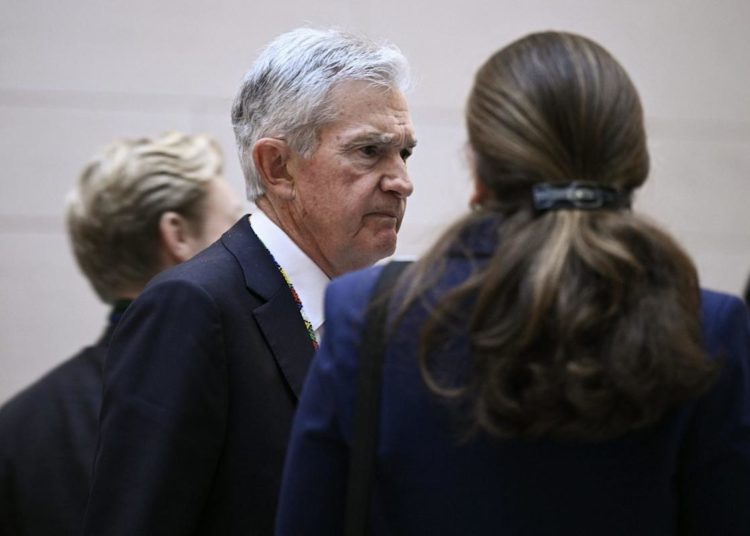(Reuters) -Negotiators from more than a dozen major U.S. trading partners are rushing to reach agreements with U.S. President Donald Trump’s administration by a July 9 deadline to avoid import tariffs jumping to higher levels, and Trump and his team kept up the pressure on Monday.
With only a limited deal with Britain completed so far, Trump has repeatedly threatened just to send a series of letters to trading partners identifying what their new tariff rate will be after the deadline, and Treasury Secretary Scott Bessent said the risk of tariffs going up next week is real.
“We have countries that are negotiating in good faith, but they should be aware that if we can’t get across the line because they are being recalcitrant, then we could spring back to the April 2 levels,” Bessent said on Bloomberg Television on Monday. “I hope that won’t have to happen.”
Just over a week remains before tariffs ranging from 10% to 50% on goods from many other countries could be imposed if those countries fail to agree on bilateral trade deals in time. Trump on April 9 put a 90-day pause on the stiff levies he had announced the previous week that sent global financial markets into a tailspin. Stocks have rallied back to record highs since then on optimism that deals will be completed on time, or the deadline perhaps extended again.
Here is where some of the key negotiations stand for several U.S. trading partners:
EUROPEAN UNION
The European Union Trade Commissioner Maros Sefcovic is flying to Washington on July 1 to meet with his U.S. counterparts, and has welcomed draft proposals from the U.S.
Progress has been opaque, but the 27-member EU has said its regulations on social media and other technology companies, much stricter than those in the U.S., are not up for negotiation.
The EU, meanwhile, is open to a U.S. deal that would apply a universal 10% tariff on many of its exports, but the bloc is seeking U.S. commitments to reduce tariffs in key sectors such as pharmaceuticals, alcohol, semiconductors, and commercial aircraft, Bloomberg reported.
The EU is also pushing the U.S. to implement quotas and exemptions to effectively ease Washington’s 25% tariff on automobiles and auto parts, as well as its 50% tariff on steel and aluminum, the report said, citing people familiar with the matter.
JAPAN
Japan says it is working to reach an agreement with the U.S. while defending its national interest. Trump, meanwhile, continues to accuse Japan of “unfair” automobile trade with the U.S., making it unclear how American importers of Japanese cars might avoid tariffs of 25%. Trump has also suggested Japan should import more U.S. oil, among other goods.
On Monday, Trump said Japan could be among those he sends a letter to identifying its tariff rate after he complained about import restrictions it imposes on America-grown rice.
“I have great respect for Japan, they won’t take our RICE, and yet they have a massive rice shortage,” he said in a Truth Social post. “We’ll just be sending them a letter, and we love having them as a Trading Partner for many years to come.”
INDIA
Early optimism has faded, with India-U.S. talks stalling on disagreementsover U.S. tariffs on auto components, steel and agricultural goods. Indian trade officials in Washington have said they are willing to extend their stay, with the main sticking point being on whether India is willing to ease trade protections on dairy, almonds, pistachios, walnuts, soybeans and its other agricultural products and whether the U.S. will ease tariffs on imports of Indian steel and car parts.
INDONESIA
Accused by some other countries of excessive red tape, Indonesia eased import licensing requirements for some goods and waived import restrictions on plastics, chemical products and other industrial raw materials on June 30, seen as a gesture of goodwill towards Trump’s July 9 deadline for trade talks. Indonesia has also invited the U.S. to jointly invest in a state-owned Indonesian minerals project as part of its tariff negotiations.
SOUTH KOREA
Despite frequent rounds of talks and some preliminary agreements, South Korea said it would seek an extension on Trump’s July 9 deadline. South Korea already imposes virtually zero tariffs on U.S. imported goods under a free-trade agreement, and so the U.S. has focused on other issues, including foreign exchange rates and defense costs, with Trump often complaining about the cost-sharing arrangement for the 28,500 U.S. troops stationed in South Korea.
THAILAND
With the threat of Americans having to pay 36% tariffs to import Thai goods, Thailand has projected optimism about its talks with the U.S., its largest export market. Thailand’s proposalshave included reducing its own tariffs, purchasing more American goods and increasing investments.
BRITAIN
Britain has raced ahead of other countries: as of June 30, tariffs on U.S. imports of British cars are down to 10%, down from an earlier 27.5%, and removed entirely for aircraft engines and other aerospace goods. The two countries are still negotiating tariffs on British steel and aluminum, with Britain seeking to avoid the 50% tariffs the U.S. has imposed on importing these goods from many other countries.
CHINA
U.S.-China talks are on a different track, with a deadline for completing a wider agreement set for August.
Talks between the two have faltered on the selling of rare earth minerals and magnets to the U.S., with China suspending those exports in response to Trump’s tariffs announcement in April, upending global supply chains. In late June, the U.S. said it had reached an agreement with China to resume those exports while the two economic superpowers continue to negotiate a broader trade deal.
(Compiled by Jonathan Allen; Edited by Dan Burns and Marguerita Choy)
The post Factbox-Where trade talks stand with major US partners ahead of tariffs-hike deadline appeared first on Reuters.



